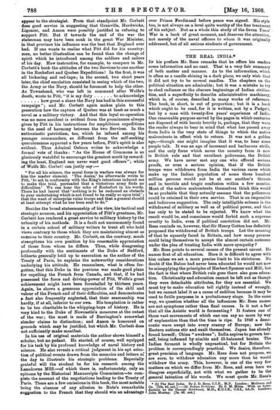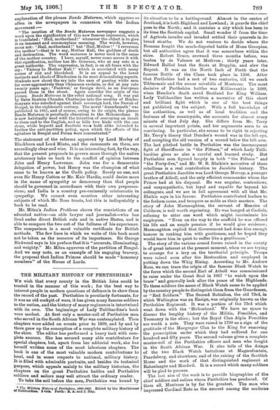THE REAL INDIA.•
IN his preface Mr. Rees remarks that he offers his readers some information and no cant. That is a very fair summary of both matter and manner. As to the information, which is often as a candle shining in a dark place, we only wish that it did not try to be several candles. The chapters on the political situation are admirable; but it was a mistake to try to shed radiance on the obscure beginnings of Indian civilisa- tion, and a superfluity to describe administrative machinery, which is, of course, described in many works of reference. The book, in short, is out of proportion ; but it is a book which ought to be read, for it is written, not by a Padgett•, but by a man with twenty-five years' experience of India. One reasonable purpose served by the pages in which centuries are disposed of with heroic brevity is, perhaps, that they warn the reader always to bear in mind that what has passed away from India is the very state of things to which the native malcontents in effect wish to return. It was not a golden age,—though one might imagine that it was, to hear some people talk. It was an age of incessant and barbarous strife, and the only force which saves the country from it now is British rule and that excellent policeman, the British army. We have never met any one who offered serious proofs, or even a serious opinion, that if the British troops were withdrawn from India the various races which make up the Indian population of some three hundred million persons would not be at one another's throats and in terrible and tragic confusion within a few months. Most of the native malcontents themselves think this would be so probable that they actually assume that the policeman could be retained in their own service. That is an impossible and ludicrous suggestion. The only intelligible scheme is the withdrawal of military as well as of political power, and that has only to be stated to be rejected. We know what the result would be, and conscience would fm-bid such a supreme cruelty to India, even if political conviction did not. Mr. Rees reminds us, however, that Sir Henry Cotton has definitely proposed the withdrawal of British troops. Let the meaning of that be squarely faced in Britain, and how many persons could bring themselves to accept the almost certain outcome under the plea of treating India with more sympathy ?
Mr. Rees points to several causes of the present unrest. He names first of all education. Here it is difficult to agree with him unless we set a more precise limit to his strictures. No doubt if the Baboo had never been educated he would not now be misapplying the principles of Herbert Spencer and Mill; but the fact is that where British rule goes there also goes educa- tion. Christianity and education cannot be left out as though they were detachable attributes, for they are essential. We must try to make education tell rightly instead of wrongly, but we cannot label it as a cause of sedition because it may be used to futile purposes in a probationary stage. In the same way, we question whether all the influences Mr. Rees names are not symptoms rather than final causes. Is it not a fact that all the Asiatic world is fermenting ? It fosters one of those vast movements of which one can say no more by way of explanation than that the time is ripe. In 1848 a demo- cratic wave swept into every cranny of Europe; now the Eastern nations stir and exalt themselves. Japan has already found herself ; China " awakens"; India aspires to govern her- self, being inflamed by nimble and ill-balanced brains. The Indian ferment is wholly unpractical, but for Britain the problem is correspondingly practical. We desire, therefore, great precision of language. Mr. Rees does not propose, we are sure, to withdraw education any more than he would withdraw the army. This, however, is one of the very few matters on which we differ from Mr. Rees, and even here we disagree superficially, not with what we gather to be the general intention of his words. We must quote Mr. Rees's
• (1) The Real India. By S. D. Bees. C.I.E., M.P. London : Methuen and Co. [10s. 6d. net.]—(2) Indian Problems. By S. M. Mitres With an Intro-
duction by Sir George Birdwood, M.D., C.S.I., LL.D. London : John Murray. [7s, 6d. net.]
explanation of the phrase Bande Mataram, which appears so often in the newspapers in connexion with the Indian
movement :-- "The mention of-the Bands Mataram newspaper suggests a word upon the signification of this now famous expression, which is translated : Hail, motherland!' whenever the object is to give it an innocent and commonplace meaning. The words, however, mean not : Hail, motherland !' but Hail, Mother ! "1 reverence the mothee—that is to say, Mother Kali, the goddess of death and destruction. The word mataram is never used in the sense of the mother country. I have, myself, never come across it with this signification, neither has Mr. Grierson, who at any rate is a great authority. The expression, in fact, is on all fours with the cry: Victory to Mother Kali I' which is associated with many scenes of riot and bloodshed. It is an appeal to the lower instincts and ideals of Hindooism in its most demoralising aspects. Students now shout the cry into the ears of passing white men far more aggressively than Chinamen exclaim, or did at any rate twenty years ago : 'Fankwei,' or foreign devil, as an European passed them in the street. Again consider the origin of the phrase. Bands Mataram is the rebel national song. It was put by Babu Bankim Chandra Chatterjee into the mouths of Hindoo Sanyasis who rebelled against their sovereign lord, the Nawab of Bengal, in the eighteenth century. The novel 'Anandamath' was published in 1881, and of course, owing to its origin, the phrase Bande Mataram is peculiarly obnoxious to the Mahomedans. It . is now habitually used with the intention of conveying an insult to them and to the English, and so kills two birds with the one stone, while boyeott and Svadeshi were both alike intended to further the anti-partition policy, upon which the efforts of the agitators in Bengal and Poona were concentrated!'
" The statement of the reforms approved by Lord Morley of Blackburn and Lord Minto, and the comments on them, are exceedingly clear and wise. It is an interesting fact, by the way, that the present proposals to govern more through the native aristocracy take us back to the conflict of opinion between John and Henry Lawrence. John was for a democratic delegation of power, but Henry was the champion of what came to be known as the Oudh policy. Surely no one, not even Sir Henry Cotton or Mr. Keir Hardie, could desire more in the name of sympathy or democracy than that people should be governed in accordance with their own preposses- sions; and India is a country pre-eminently aristocratic in kympathy. We cannot even mention other interesting subjects of which Mr. Rees treats, but tbis is indisputably a book to be read.
Mr. Mitra's Indian Problems shows the convictions of an educated native—an able lawyer and journalist—who has lived under direct British rule and in native States, and is able to compare the two out of the fullness of his experience. The comparison is a most valuable certificate for British methods. The few lines in which we write of this book must not be taken as the measure of its importance. Sir George Birdwood says in his preface that it is "accurate, illuminating, and weighty." Mr. Mitra approves of the partition of Bengal. And we may note, as an example of his engaging bravery, the proposal that Indian Princes should be made " honorary members" of the House of Lords.















































 Previous page
Previous page